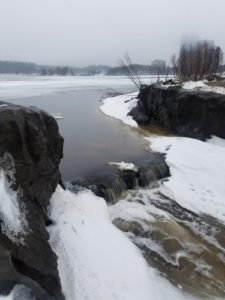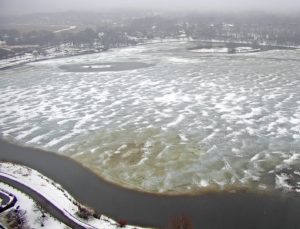Normandale Lake Full

March 14, 2019
The Nine Mile Creek Watershed District started refilling Normandale Lake on March 7, as planned, and the lake is now full. The lake was emptied as part of the District’s drawdown project designed to control the aquatic invasive plant curly-leaf pondweed. The lake was drawndown in August 2018 and remained mostly empty of water throughout the winter to promote a deep-freeze of the lake bottom sediment. A winter freeze of the lake sediment bed can kill curly-leaf pondweed’s vegetative propagules (called turions), thus stopping the plants’ reproductive cycle.
The outlet structure allowing the lake to refill was closed off on March 7, 2019. A predictive model developed by the District’s engineering firm had given a 26% likelihood that the lake would refill by March 21st and a 96% likelihood that the lake would refill by April 1st. Due to rain and melting snow, the lake was full by March 14th.

The District will conduct plant surveys this summer to determine the success of the drawdown on the curly-leaf pondweed population. However, the weather conditions this winter were conducive to a hard freeze of the sediment. At the beginning of February, the top 14-24″ of the sediment across Normandale Lake was frozen.
The District will take additional lake management steps to improve water quality in Normandale Lake this year and in the future. An alum treatment will occur this spring to reduce phosphorus levels in the lake. When aluminum is applied to a lake as a solution of alum (aluminum sulfate), it forms an insoluble aluminum hydroxide floc that settles to the lake bottom. The aluminum binds with phosphorus in the sediment to prevent it from recycling back into the water column. Alum is a safe and effective way to control phosphorus in a lake. Scientific studies show that alum is safe for fish, invertebrates, and humans. Alum is currently used for treating drinking water as well as in food and cosmetics.
Contact Erica, Program and Project Manager, for questions regarding the Normandale Lake Water Quality Improvement Project at 952-358-2276.
